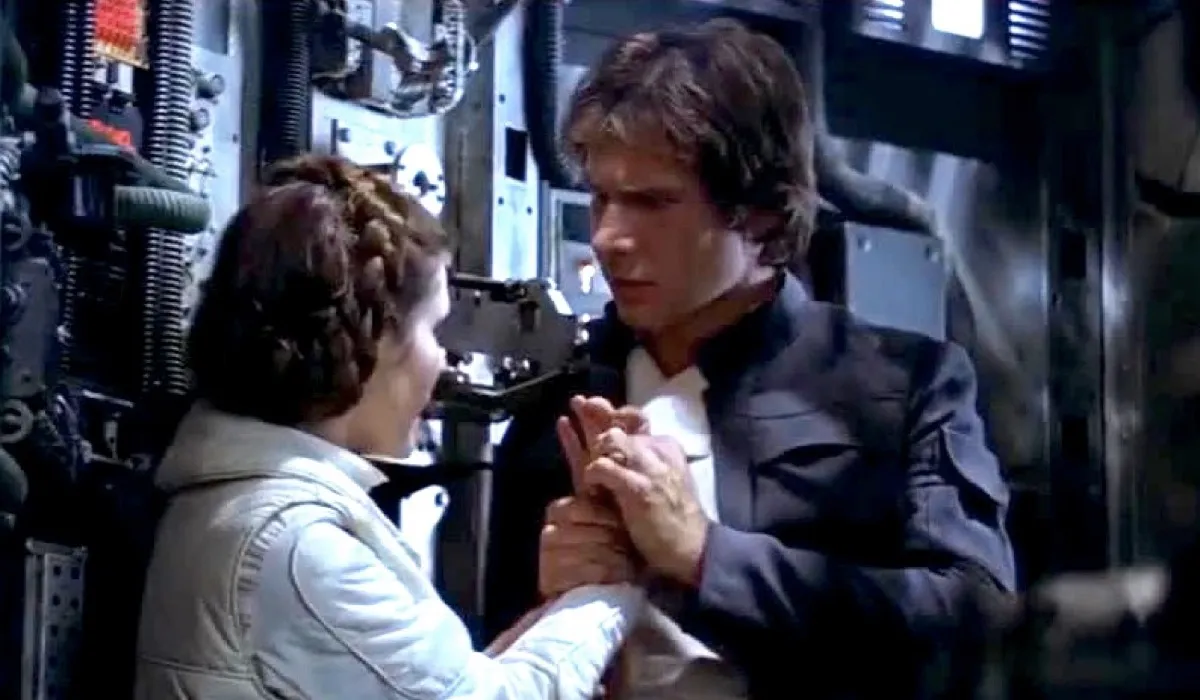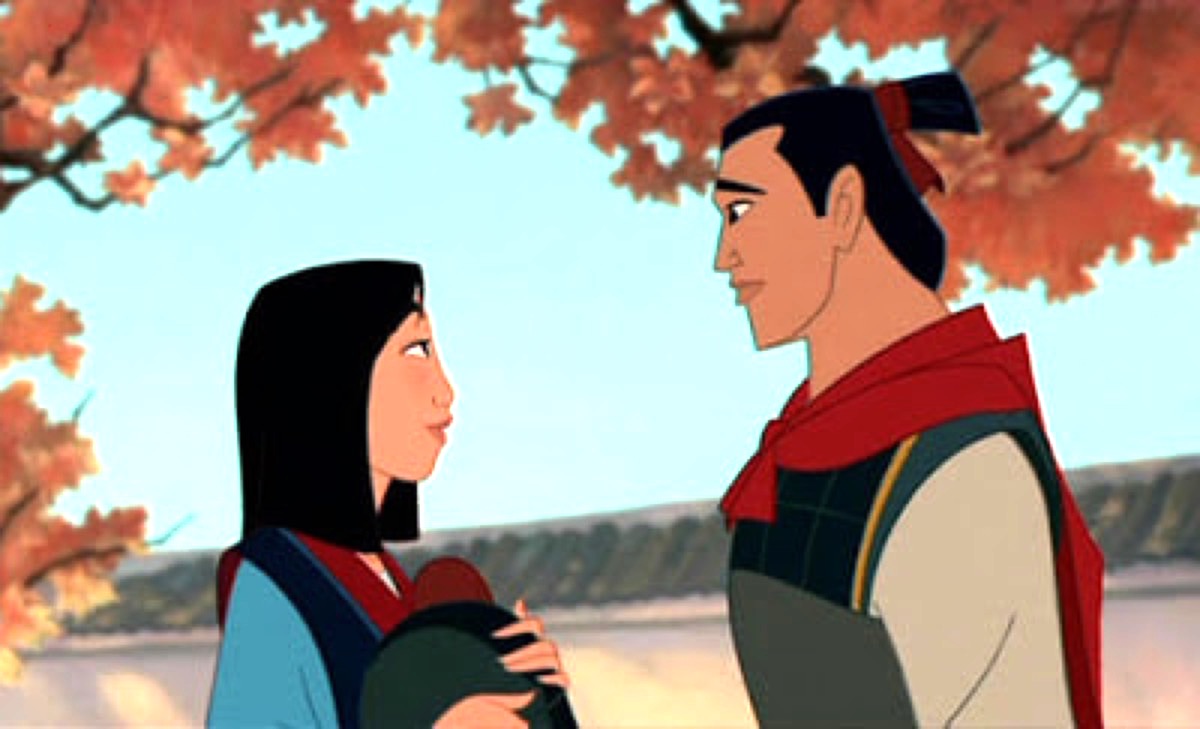It’s not the iconic Greedo scene that gets me, or the legendary “I know.” For me, it’s that moment on the Death Star where Han Solo, at a loss and trying to stall, tells the imperial troopers, “We’re all fine here …” Then comes the line that will give him away to the stormtrooper and endear him to me forever: “How are you?” Just as the guard on the other end of the intercom figures out what’s happening, Han shoots up the entire apparatus.
“Boring conversation anyway,” he mutters. Every time I watch this scene, my crush on this character, established when I was six, grows exponentially. I love mapping his evolution over and over again. He starts out with so much confidence in who he is—the guy who shoots first and doesn’t believe in any force other than dumb luck.
Slowly, that confidence evaporates and is replaced by faith in a real cause. His small, exasperated interaction with the storm-trooper reveals his true chaotic nature, his predilection for improvising, and the revolutionary spirit that will eventually inspire him to become part of a movement bigger than himself. Of course, he does all of this while being ruthlessly funny. Who could blame me for loving him?
As it turns out, a bunch of men. All I need to do is put on one of my several shirts featuring Harrison Ford’s face to get into an argument I can’t win.
“Actually, Han Solo was a predator,” my male acquaintances tell me. Sometimes, this allegation stems from actual history—thirty-five-year-old Harrison Ford’s affair with a nineteen-year-old Carrie Fisher, always suspected and finally confirmed in Fisher’s autobiography.
Whether we have a moral obligation not to rewatch the work of predatory men is an important question, but it’s also different from what I’m talking about. More often, the men who tell me about Han Solo, the character, believe they have recognized something in his treatment of Leia, usually in the scene in Empire where they share their first kiss. I can quote this scene by heart.
“There aren’t enough scoundrels in your life,” Han says.
“I happen to like nice men,” Leia retorts.
Han moves in closer. “I’m a nice man.”
“No you’re not, you’re—”
As the music swells, Han kisses her but is immediately interrupted by C-3PO, both annoyingly and officiously, as he has isolated the reverse power flux coupling. What’s wrong with this scene, according to men I’ve argued with at parties? Everything. Leia is trembling as Han puts his hands on hers. She does not consent to this action and argues with him as he moves in to kiss her. I tell them that Carrie Fisher isn’t playing it that way—she’s not scared of Han, but of the conflicted feelings inside herself.
“But isn’t the film saying ‘No means yes’?” they ask me, and that’s where my argument falls apart—or expands into something more complicated, depending on how annoyed I am at this point. Because of course the movie is saying “no means yes.” That’s what most films say. Hollywood has always been terrified of the implications of female desire.
In order to come across as “moral,” a female protagonist must resist the advances of her male counterpart, at least for the first act of the film. Star Wars, taking its cues from Swashbuckler movies of the 1930s, fully indulges in this toxic narrative. Soooo … does that mean I do think that Han Solo is a predator?
It means that, as a female-identifying fan and screenwriter, I find myself constantly analyzing my favorite stories and discovering messaging within them that undermine the ideals that I believe in. It means that I’m perfectly happy to throw Casablanca, The Searchers, and Pulp Fiction out the window, but it’s kind of different with Star Wars, a piece of art that has influenced not only my writing, but who I am as a person. It means that of course there are icky elements to Han and Leia’s romance, but there’s also pathos and danger and texture that I’m not willing to give up on just yet. And furthermore, isn’t it kind of antifeminist to shame a woman for taking pleasure in a narrative?
White men have been trying a lot, recently, to prove that Star Wars belongs to them and only them, but Han Solo—with his humor, his insecurity, his romance-novel-worthy hair—has always belonged to me. I see the same complexity in Harrison Ford’s performance that so many people saw in Marilyn Monroe’s in Diamonds Are a Girl’s Best Friend—in the second act of A New Hope, his machismo act begins to fall apart, as evidenced in the anxiety-laced interaction with the stormtrooper, and a later moment where he barrels down a hall of the death-star, screaming and shooting his blaster without looking back.
All this to say my feelings about Han Solo are complicated and become even more so in relation to my feminism. Feminism itself is complicated. No one can explain it simply without diluting its nuances, facets, and flaws, but that doesn’t stop Hollywood from trying.
Rather than what we need (more women writers, more women writers of color, more trans and nonbinary writers, and so much more), major studios tend to give us bad-faith displays that are supposed to make us feel seen. That infamous Endgame shot of all the female cast members, which foregoes narrative logic in order to prove the film’s—and Marvel’s—feminist bonafides, comes to mind. (Why are all the women grouped together like this during a battle? Are there no boys allowed? Are they having a ’70s-style rap session? Who organized this?)
Disney’s decision to cut Shang from Mulan “because of the Me Too movement” serves as another example. Shang and Mulan don’t act on their feelings until the end of the original film, when he is no longer her superior. This movie could be shown in offices as an example of appropriate protocol for a workplace romance.
And then there’s the endless supply of “strong” female protagonists Hollywood has been throwing at us since the ’90s. You know the kind I’m talking about. They even exist in Bond films now. They sport a lot of cleavage, but they also have machine guns, so we know that they’re independent.
Every now and then, though, magic happens. Every now and then, we get a movie like Patty Jenkins’ Wonder Woman. Wonder Woman’s Diana is so many things—strong, sure, but also naive, cocky, impulsive, sexual, and unselfconscious.
Her love interest, Steve Trevor, displays as much nuance as Diana does. Jenkins borrows a little from the Han Solo archetype: Steve is swashbuckling and funny, but picks up on the vulnerability in that character trope and expands on it. As played by Chris Pine, Steve shows some shyness in his interactions with Diana—or maybe it’s not shyness, but the ability to give up some control and allow her to take the lead. Jenkins doesn’t completely destroy the figure of the rogue with a heart of gold; she just shifts it a little to suit her sensibilities, to magnificent effect.
I don’t believe in revising archetypes as a hard and fast rule. There are some elements of film history that need to stay in the past. Personally, I would feel completely comfortable never watching Manhattan again or seeing a movie like it. Moreover, I’m evidently happy to have those arguments with men at parties. A lot of them are trying to understand the complex, often confusing experience of being a woman who loves movies, but telling me that my love for Han Solo is a result of my internalized sexism is not the way.
Furthermore, it isn’t feminism. Feminism is the act of letting me decide for myself, preferably on the set of a movie I’m directing.
(images: Disney/Lucasfilm)
Want more stories like this? Become a subscriber and support the site!
—The Mary Sue has a strict comment policy that forbids, but is not limited to, personal insults toward anyone, hate speech, and trolling.—











Published: Jun 26, 2020 10:55 am